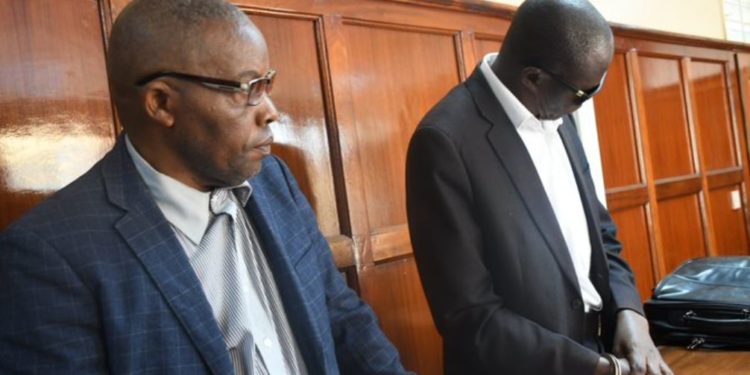In a significant ruling, two former National Youth Service (NYS) officials, Samuel Wachenje and Hendrick Nyongesa Pilisi, have been sentenced to prison for orchestrating a KES 791 million fraud scheme. The Milimani Anti-Corruption Court in Nairobi found the former director of finance, Samuel Wachenje, and former head of procurement, Hendrick Nyongesa, guilty of conspiracy to defraud the state agency in connection with a road construction project in Kibera.
Hendrick Nyongesa, sentenced to seven years in prison without the option of a fine, was convicted on charges of falsifying documents under Section 347(a) as read with Section 349 of the Penal Code and breach of trust by a public servant under Sections 127(1) and 127(2). Samuel Wachenje received a concurrent five-year sentence on similar charges.
Lady Justice Wendy Kagendo Micheni noted that the prosecution presented compelling evidence, proving that the officials authorized payments without necessary oversight. “The actions of the accused led to the loss of KES 791 million in public funds allocated for critical infrastructure,” she stated.
The case, led by Director of Public Prosecutions (DPP) Renson Ingonga, involved 41 witnesses, including former NYS Senior Deputy Director-General Adan Harakhe and Nixon Oborah, the Acting Chief Finance Officer at the State Department for Planning. Testimonies revealed that from December 2014 to April 2015, the officials manipulated the Integrated Financial Management Information System (IFMIS), inflating amounts across 25 transactions and adding extra zeros.
The funds were reportedly funneled to three companies associated with businesswoman Josephine Kabura Irungu—Reinforced Concrete Technologies, Form Homes Builders, and Roof and All Trading. These companies received KES 320 million, KES 218 million, and KES 252 million, respectively. Family Bank officials also testified, confirming that KES 77 million from the diverted funds had been transferred to another account linked to the accused, further implicating Wachenje and Nyongesa.
State prosecutors presented documents showing a discrepancy between the KES 791 million authorized and the actual project cost of KES 78 million. The court found that the inflated figures matched additional amounts fraudulently added, confirming the scheme’s fraudulent nature.

















